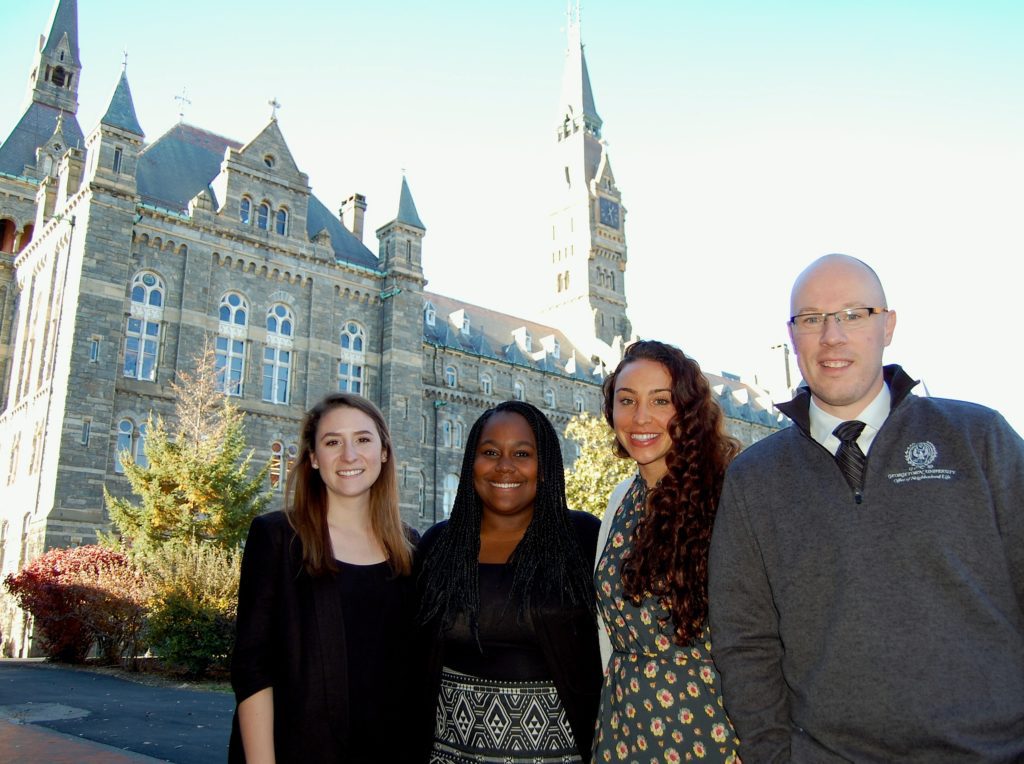Town-Gown Link: GU’s Office of Neighborhood Life
By • January 24, 2018 0 1203

It is intentional that Georgetown University’s Office of Neighborhood Life sits “outside the gates” at 36th and N Streets, says Cory Peterson, director since 2013 of the office, which was created as part of a historic agreement between the university and Georgetown residents.
In August of 2012, when town and gown reached an accord after years of discussion, Ron Lewis, who then chaired the Georgetown-Burleith Advisory Neighborhood Commission, said: “This is an extraordinary event in the life of our community, and it’s very promising. We have found a way — the community and the university, together — that offers a new cooperative spirit and real results on issues that have divided us for years.”
The deal, which approved the university’s 10-year campus plan, limited the school’s additional growth outside its main campus in zip code 20007, capped student enrollment at certain intervals and called for additional on-campus dormitories “to centralize student social life on the campus.”
Many of these goals have been attained. There is a new dorm named for Pedro Arrupe, S.J., as well as the renovated New South Dormitory at the western terminus of Prospect Street, which houses the Healey Family Student Center. Student housing was reduced on the university’s “Magus Row” on 36th Street. Reducing traffic congestion and relieving the immediate area’s parking challenges were also part of the deal.
Gone are the days of Georgetown students simply living in the neighborhood because the university lacked adequate campus housing. Students are now told: “Living off campus is a privilege and an opportunity for learning and personal growth. It is a time when you are not only a student at Georgetown but also a member of a local community, whether it’s in the District, Virginia, or Maryland.”
Times have changed, with rules firmly in place for those who live outside Healy Gates — following “clear standards for appropriate off-campus behavior and a results-based system for maintaining the peaceful, quiet atmosphere of our residential neighborhoods.”
The school tells its students “to be responsible citizens and good neighbors. All Georgetown students are expected to comply with Georgetown University policies, the Code of Student Conduct, the Office of Neighborhood Life policies, local laws, and general community standards of consideration for kindness toward others.”
That’s where the Office of Neighborhood Life, located in a small yellow row house at 1301 36th St. NW, comes in.
Peterson — who joined the Georgetown University administration with a bachelor’s in psychology from the University of Utah and a master’s in educational administration from Texas A&M — works with four full-time staffers, two of whom live in the neighborhood. An assistant director is soon to arrive.
Among other responsibilities, the office coordinates SNAP, the Student Neighborhood Assistance Program, a service that also responds to bad student conduct off campus. The office sometimes employs off-duty cops. It also checks on trash disposal, yard cleaning and snow shoveling. (Students can pick up a shovel or a rake at the office.)
Off-campus students must keep their address updated with the school, attend a mandatory “Hoya Living Off Campus Orientation” and sign up for bulk trash pickup, if needed, when moving in or out.
On its website, the office offers advice on leasing and landlord verification, as well as a message to landlords on accountability.
Peterson works to ensure that students are “more mindful of residents,” especially when it comes to noise. The office gives out placards that read: “Know Your Noise” … “Don’t disturb Jack the bulldog’s beauty sleep.”
The office also explains how house parties and excessive noise can become disorderly conduct, a criminal offense. From time to time, Peterson gets an earful from close-in neighbors who complain of rowdy students celebrating a homecoming or partying too long into the night. (In 2016, he and the university had to apologize to Georgetowner columnist and university neighbor Michelle Galler for a group of drunken students and alumni in front of her house, an incident that made the news.)
Nevertheless, for residents who have lived in Washington’s oldest neighborhood for years if not decades, the office serves as a welcome addition to better relations with the hometown university, as part of the Georgetown Community Partnership. To underscore that, the Burleith Citizens Association gave the unassuming Peterson an award of appreciation for his “exceptional cooperation with the residents … that has forged a welcome collegiality.”
Meanwhile, Peterson continues to give obvious but essential advice young adults ought to heed: “We further encourage you to conduct yourselves in ways that reflect the best of who you are and the best of the university, and to be women and men for others.” If only it were that easy.
OFFICE OF NEIGHBORHOOD LIFE MISSION STATEMENT
The Office of Neighborhood Life supports all students, non-students, and permanent residents in the communities surrounding Georgetown University. Our office will educate students about university policies and local ordinances; continue to build and strengthen neighborhood relations by facilitating dialogue; and promote civic citizenship to create a positive quality of life for everyone living in the neighborhood.
CONTACT FOR NEIGHBORS
To discuss the university’s presence in the neighborhood, call Cory Peterson at 202-687-5138 or email neighborhoodlife@georgetown.edu. After business hours, call the Georgetown University Helpline at 202-687-8413 or visit studentliving.georgetown.edu/off-campus.
INFORMATION FOR LANDLORDS
Landlords concerned about the home and safety conditions of students in the neighborhood are referred to the university’s “Properties of Concern” and “Safety Tips” webpages.
ADDITIONAL CONTACT
Christopher Murphy, Vice President for Government Relations and Community Engagement
202-687-4403
christopher.murphy@georgetown.edu
CORRECTION
In the Jan. 10 Georgetowner, the email address for Richard Livingstone, Ward 2 liaison in the Mayor’s Office of Community Relations and Services, was incorrect. It is richard.livingstone@dc.gov.

